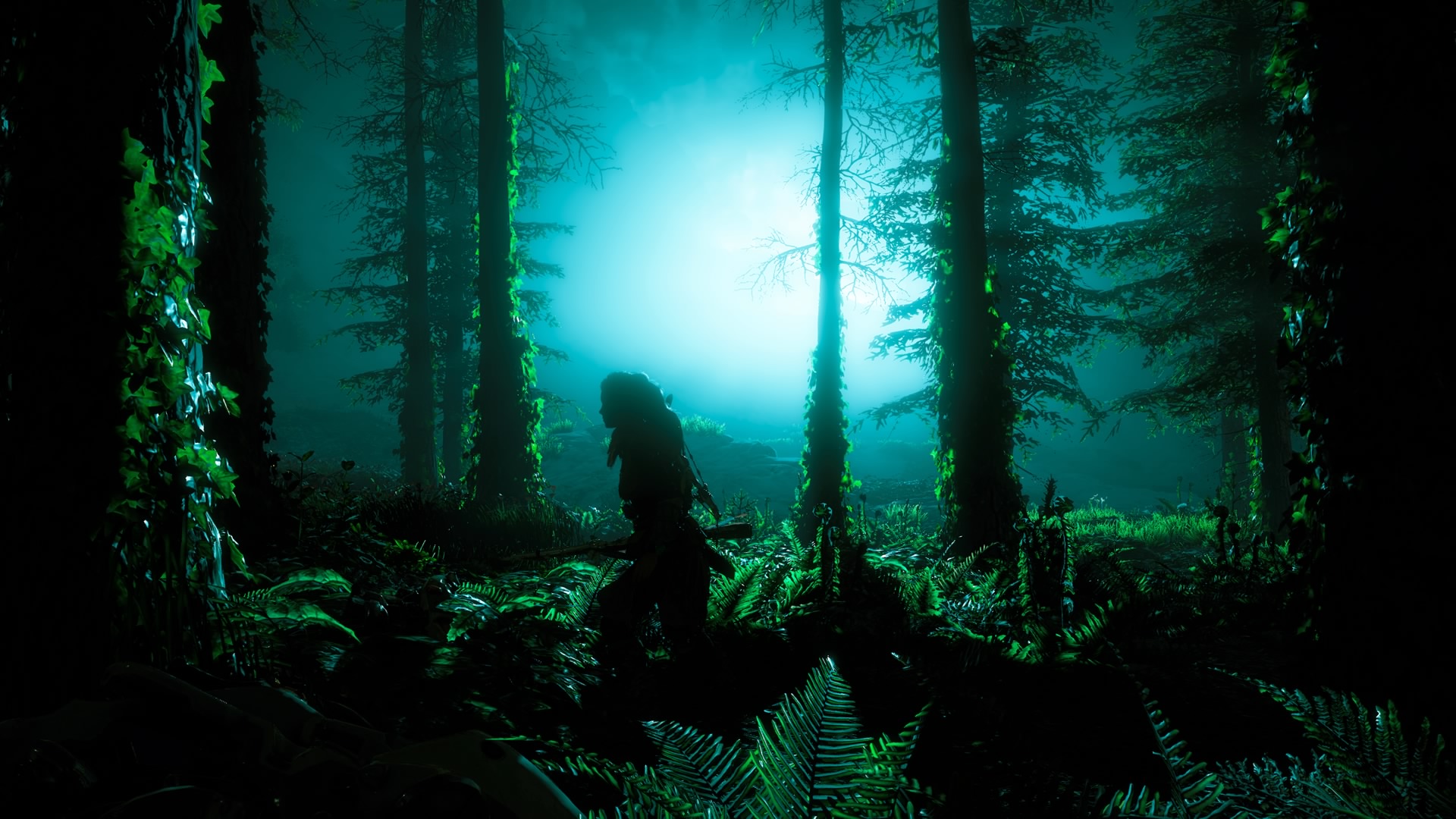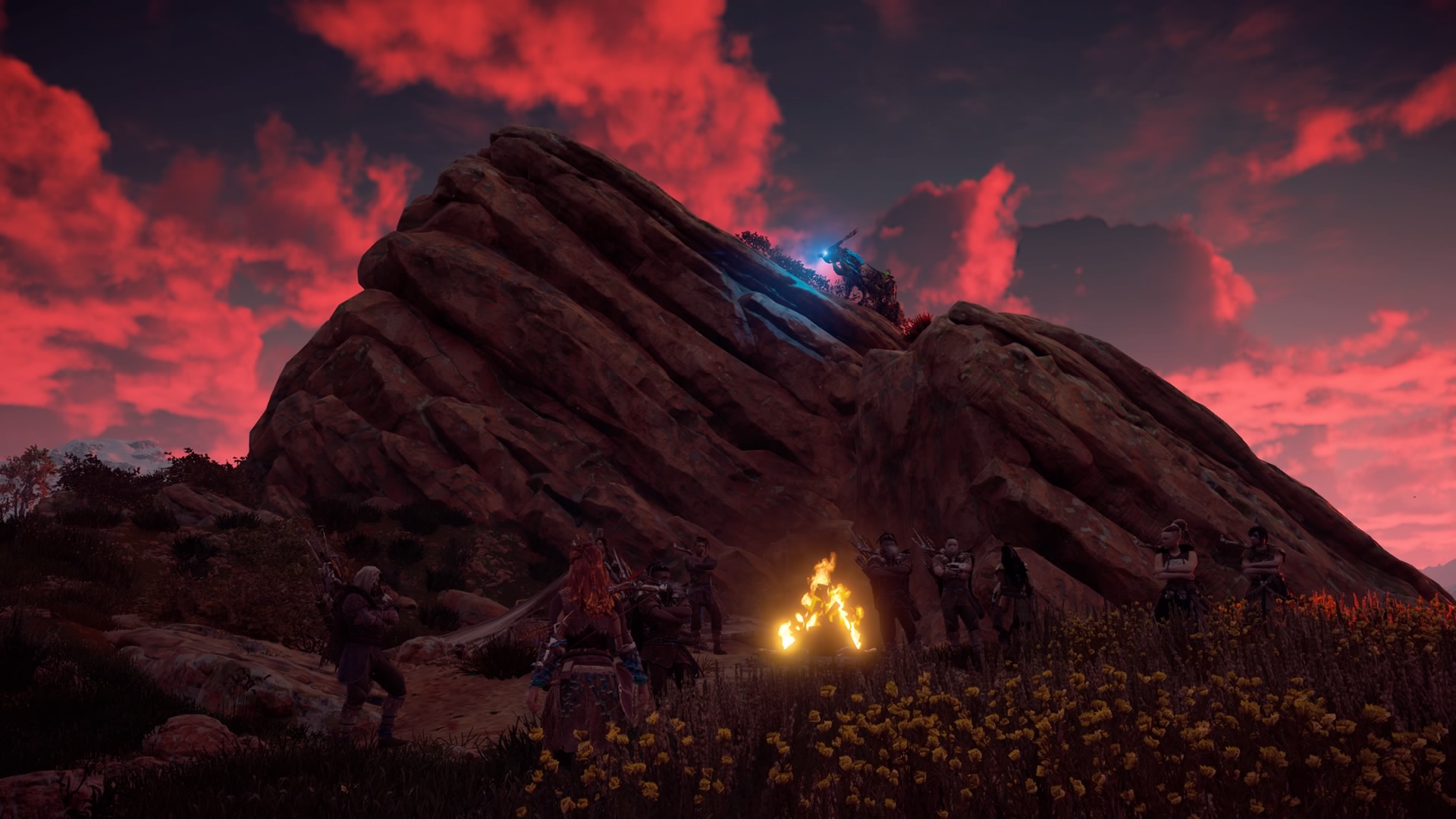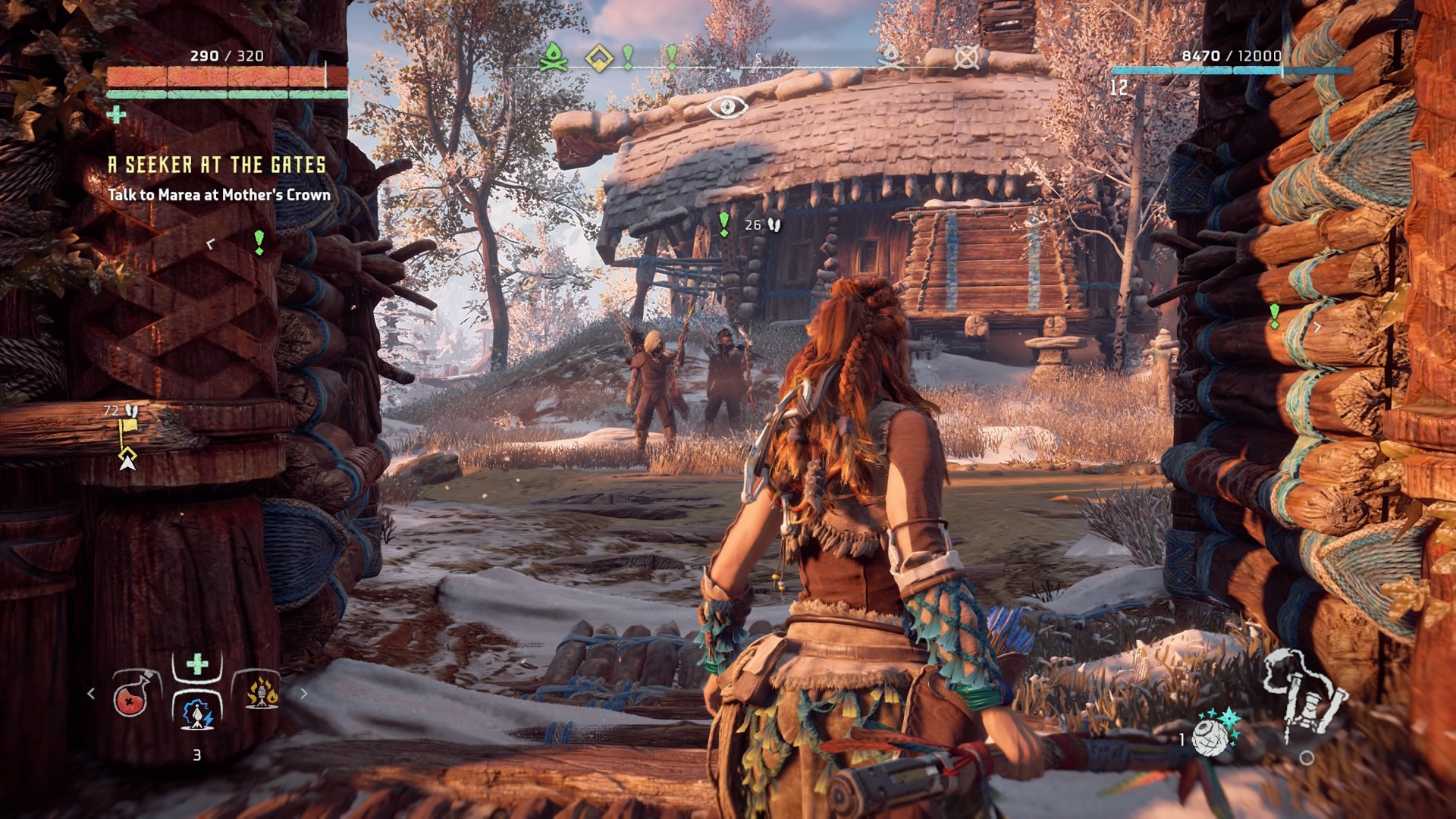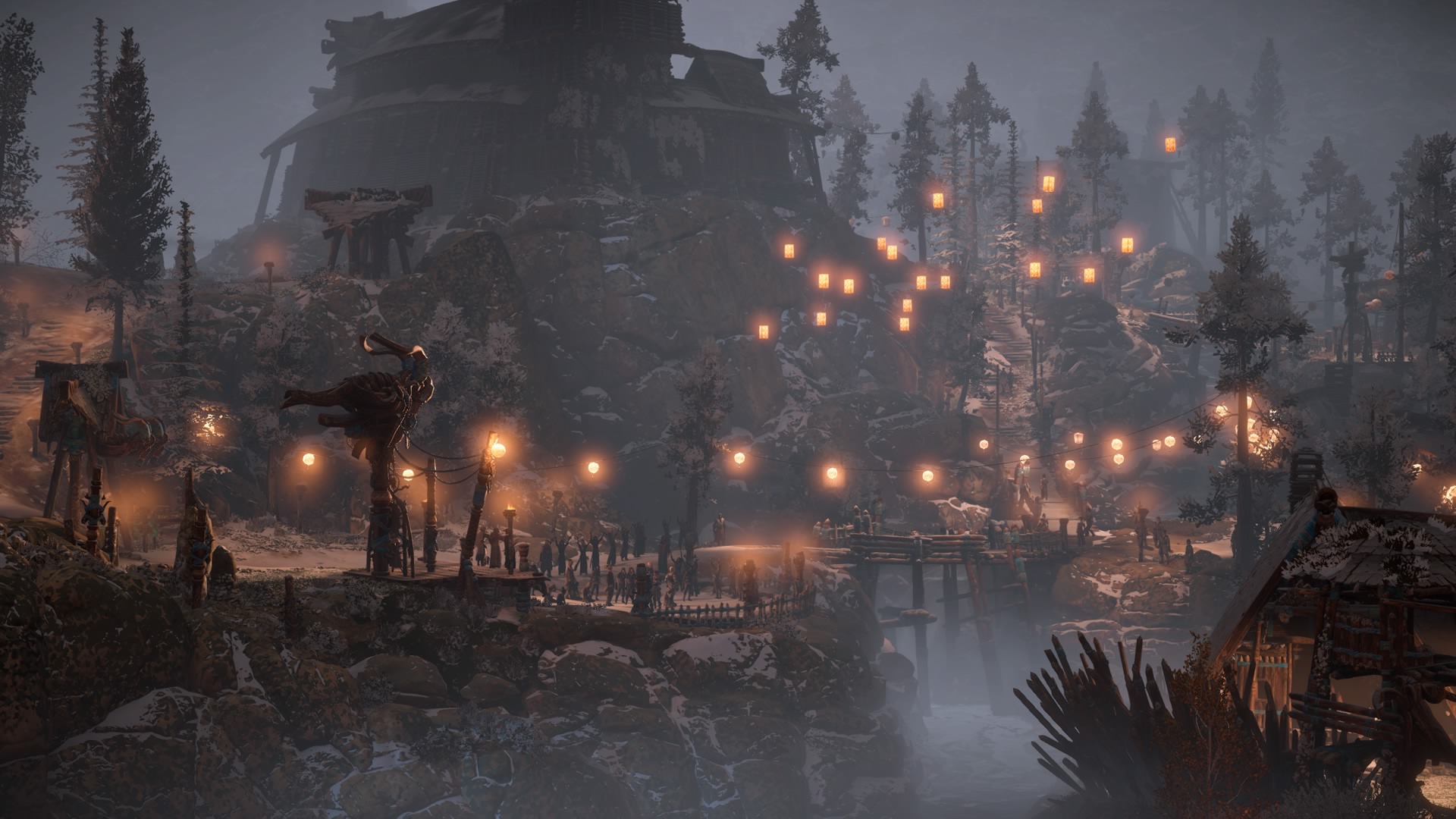I figured it would be the same with Horizon. I’d be intrigued by the futuristic world, my heart would pound with joy while watching the gorgeous trailers, but then I’d drop the game after playing for just a few hours. I’d hear reverent whispers about its 30-hour campaign and wonder how the hell anyone could get through it all. It would seem like too much.
But, with Horizon, 30 hours sounds like barely enough time. I wish it were 60 hours long. I wish it were an infinite MMO that I could live inside of for years to come. Finally, I understand open-world RPGs.
Aloy drives my infatuation with Horizon, which lands on the PlayStation 4 on February 28th. Aloy is the kind of character I want to hang out with for hours on end — compassionate, thoughtful, independent and the best warrior in the land. She radiates power, and it feels marvelous to wield her strengths and fight through her weaknesses.
Aloy is a lifelong outcast of the Nora tribe, a matriarchal society stationed in the wilds of the future, living among the ruins of our long-dead, technologically advanced civilization. The Nora are strict and isolationist, and its tribe members believe fiercely in the All-Mother, the goddess of nature. Of course, as an outcast, Aloy is less inclined to believe blindly in the gospel of the All-Mother.
Just beyond the Nora’s impressive huts and bonfires, dinosaur-like robots prowl the wilderness, hostile protectors of the precious resources that compose their bodies. No one knows where the metal beasts came from. However, they have something to do with the death of a hauntingly familiar society whose buildings, gadgets and corpses lie in ruins across Aloy’s homeland.
This is where Horizon separates itself from other open-world RPGs: It’s apocalyptic like Fallout, but it’s set in environments so lush they would make Bob Ross blush. It’s fantastical like Dragon Age, at least until the robot dinosaurs show up. It’s futuristic like Deus Ex, but feels like a story set in a distant, magical past. Horizon occupies a delicious space between sci-fi and fantasy, blending the genres into something that feels distinctly modern and unique.
This allows Horizon to tell a new, compelling story about our relationships with nature, technology and motherhood. It also allows Aloy to come to life.
At one point a few hours into the game, Aloy and a high matriarch are confronted with a computer interface embedded in the bowels of a mountain — the matriarch falls to her knees in supplication, convinced the All-Mother is speaking to them. Aloy doesn’t flinch. She’s spent her life on the fringes of Nora society, exploring caves filled with ancient technologies and learning how to fend for herself. She knows this isn’t a spiritual being and she doesn’t hesitate to tell the matriarch as much.
It sounds like a small moment, but it speaks to Aloy’s character as a whole. She’s fiercely independent, maneuvering around conversations as readily as she does a spear. She believes what she can see, touch and kill, and she isn’t afraid to use technology to her advantage.
A handful of mysteries enrich this underlying tension between nature and technology, and make Aloy’s world feel real: What happened to the ruined civilization? Where did the machines come from? What do they want?
But, these aren’t the most compelling questions in Horizon. They serve as background tales, solidifying the game’s narrative in a fresh, complex and fascinating world. Instead, the game is framed around a more specific, but no less complicated, question: Who is Aloy? And, just as importantly, who was her mother?
Aloy approaches these questions fearlessly and armed to the teeth.
Horizon features a robust crafting and upgrade system, allowing players to modify weapons, clothing and other items with unique abilities, and build a wide range of deadly traps and tools. Aloy herself also levels up as the game progresses, learning new skills that open up combat scenes in wonderful ways.
The wide range of weapons available in Horizon could easily be overwhelming, but instead it feels natural to tailor Aloy’s attacks to each situation. And it helps that the game is gorgeous, no matter which battle strategy Aloy employs.
Allow me to set the scene: Aloy is on a grassy ridge in the dead of night, staring down a gaggle of Watchers. By this point in the game, my hunter skills are so honed that I simply mosey up to one of the machines lurking in the tall grass, override it and sit back as it destroys all of its former comrades. In real life, I even set down the PS4 controller and answer a text message. When I hear the last Watcher die and I look up again, it’s to see the game’s dynamic day-night cycle in full effect: The evening sky, previously dark blue and green, has transformed into a sunrise of gorgeous early-morning pastels. Pink and gold light shines down on a tree-lined field littered with a half dozen sparking robot-velociraptor corpses. I take a moment to soak it all in (and grab some screenshots).
Horizon is, in a word, seamless. It’s massive, yet there are no loading screens peppered throughout the map (aside from fast travel and death), leaving Aloy’s path open as she travels from village to village. There are plentiful side quests and save points (giant campfires) dotted along the way, and miles of mysterious wilderness for her to explore.
Aloy’s personal journey is intrinsically tied to the broad mysteries hovering over Horizon‘s world, and each new revelation unfolds beautifully throughout the game. The team at Guerrilla Games have crafted a powerful narrative headlined by an equally compelling protagonist: a young warrior desperate to discover her true identity and perhaps save the world in the process.
Maybe that’s what I love about Horizon. It’s familiar and new at the same time, but it’s infinitely relatable. Though I’ve never run across a giant metal stegosaurus in my own life, I know how it feels to wonder who I am and what I’m doing on this planet. I’d bet everyone knows how that feels. Maybe even giant robot dinosaurs. Maybe.








